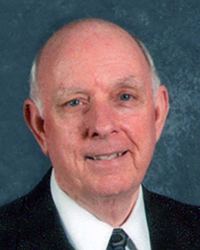


by Bobby L. Graham
How Can We Become Better Servants?
This question was asked of me by a group of deacons before I spoke to the entire congregation about the matter. What a noble aspiration for men already serving as special servants to desire to improve their capacity for service! Surely these matters are sufficiently important that they deserve a wider audience among people interested in being the Lord's servants.
Some preliminary considerations deserve our attention. Deacons are special servants, made such by their appointment to a position of seeing to special needs in a local church under the oversight of elders (1 Tim. 3:1-13; cf. Acts 6:1-6). They also are servants of the Lord first, before they are asked to serve in a special role of service to the congregation. It is their general service to their Lord and Master which attracts attention to them as being the kind of men depicted in God's description of deacons in 1 Timothy 3, and which they continue to display as deacons. "For those who have served well as deacons obtain for themselves a good standing and great boldness in the faith which is in Christ Jesus" (1 Tim. 3:13).
Because they were general servants (doulos) of the Lord before they became special servants (diakonos) in relation to a task/responsibility, we turn our attention to some teaching of Paul's in writing to the Thessalonians, specifically the first ten verses of chapter one. There in verse 9, he makes clear that they had turned/been converted from idols to serve God, as they changed their allegiance from vanity/nothing to the Creator of all.
For the benefit of posterity, the Holy Spirit deposits a treasure of information by defining the elements of their service to the Lord: (1) better acquaintance with the Lord being served, (2) better understanding of themselves as servants, and (3) better knowledge of the service they were rendering.
We have complete information concerning the Lord whom we serve in the passage. God had elected (chosen) them to salvation through their faith and obedience to the Spirit's instructions (v. 4; cf. 2 Thess. 2:13; John 17:17). Their initial obedience to the Gospel of Christ carried through to their lives as servants, because they became examples to others (vv. 5-8). Obviously, their service was an active service as they became joyful imitators of the Lord Jesus in much affliction (v. 6). They lived and served in hopeful anticipation of the risen Lord's return to deliver them from the coming wrath (v. 10). What motivation we receive to serve the Lord better when we consider where we came from, who brought us to our place as servants, and our hope for His return!
This same passage also provides a better view of who we are, as opposed to who we were, and of what our service to God entails. Former idolaters have now become servants of the living and true God and His Son, the returning Lord (vv. 9-10). Additional information tells us that we are beneficiaries of God's grace and peace (v. 1). If we serve as the Thessalonians did, then others will thank God for us and pray for us (vv. 2-3). Why? Because we are also examples of workers in the gospel (vv. 7-8). Patient waiting for the Lord also will be a hallmark of our service, because our faith is in the Lord, not in men (v. 10). Our work done in faith, our labor performed out of love, and our steadfastness/endurance because of hope will become a way of life, not just a Sunday-Wednesday profession (v. 3).
Surely deacons can benefit from a larger "dose" of this medicine. All servants of the Lord, whether deacons or not, can profit from this information about these first-century servants. Even those not already enrolled as servants can understand the blessing of such service to the Lord, as opposed to the nothingness of alien service to other gods.
Author Bio: Bobby actively participates in fill-in preaching, Belize trips, teaching an hour each day at Athens Bible School, and in gospel meeting work. He and his wife, Karen, have three children: Richard, Mary Katherine Winland (Darren), and Laura Paschall (Jeremy). He can be reached at bobbylgraham@pclnet.net.

